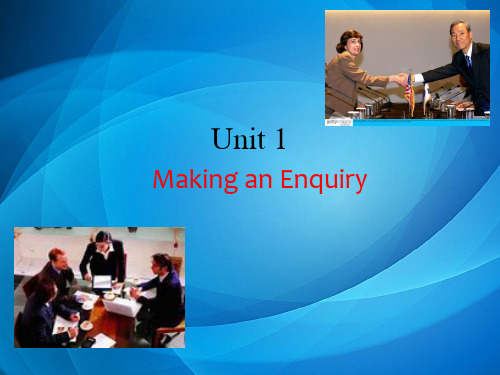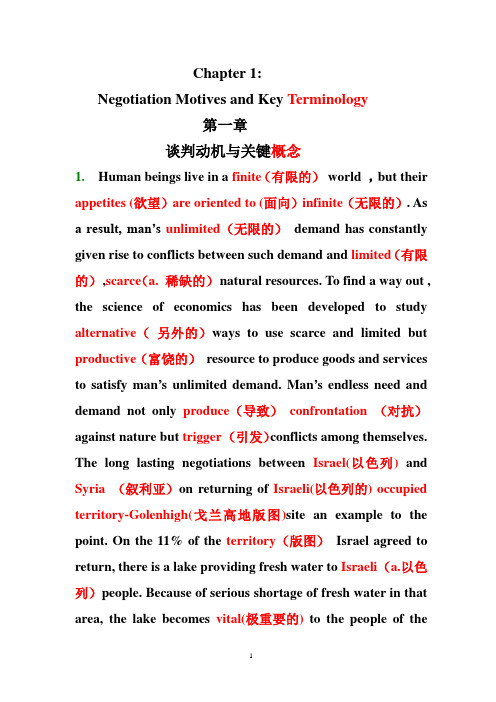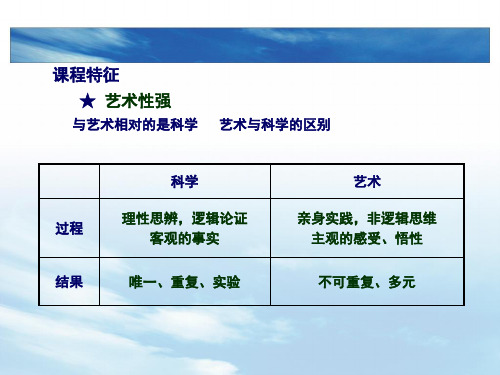商务谈判unit1
商务谈判(第一部分)

七.损害及违约赔偿谈判
一.对方谈判人员的性格与谈判风格;
客户一般分以下几种类型
“牛头犬”型: 特质表现为壮大、强势、威胁、 急噪、冲动;喜欢发好施令、肢体语言多、说 话大声;无法体会合作的价值;喜欢兴风做浪、 直来直往;冒险、主动。
六. 之前要有充分的准备
七. 了解他的公司
八. 了解谈判者的对手
九. 评估对方的实力
一○.猜测对手的目标
六、谈判组的组成
一.谈判组的形式,分两种,一种是单兵作战,二 是形成一个组。
二.谈判的策略,包括战略和战术,所谓战略就是 指谈判中用来取得既定目标所制定的一个全面方 针;战术指执行战略的具体方法。
组内要互相通气 所谈的内容
添加标题
夸大地介绍本组 的成员
添加标题
必须肯定本组成 员提出的问题
另外,关于翻译的设立和作用:
对于老客户、传统商品、小金额可以不要翻译,但一般 的大型谈判,最好主谈带翻译。有下列作用:
1. 可以将本来说错的话通过翻译将错误的话拉回的机会。 2. 有个充分思考的时间 3. 可以特别全神贯注的观察对方
共同点与分歧 点同时存在。
谈判的三个层面 1、竞争性谈判:双方各自寻求己方利益; 2、合作性谈判:各方都尝试寻求一些共同点去建立关系及发展相互可以接受的方案; 3、双赢谈判:也称创意谈判,一场谈判不是你输我赢,胜者为侯,败者为蔻,而应该是双方合作 互利的过程,每一方都应是胜者,最终达成的协议必须对每一方都有利。
按谈判的内容来划分
一.( 1)投资谈判。包括有关投资的周期、投资的方向、投资的方式、投 资的内容与条件、投资项目的经营及管理、投资者在投资活动中的权利、 义务、责任和相互关系所进行的谈判。
【商务谈判】1第一章 商务谈判概论课件

2019/8/11
当天晚上11点钟,谈判组长龙永图打电 话给美国的驻华使馆代办(当时他们的大使 在美国国内)。表示,作为常识,在经历这 么一个世界瞩目的谈判以后,双方总得见 一次面吧,至少需要商量一下如何对新闻 界发布此次谈判的结果。大概一个小时以 后,美国贸易代表回话了,说,他们上午 10点的飞机,出发之前见一见是必要的。 她说能不能4点半钟见。
• 商务谈判是以追求经济利益为目的; • 商务谈判是一个互动过程; • 商务谈判是互惠的,是不均等的公平; • 商务谈判是合作与冲突的对立统一; • 商务谈判涉及面广。
2019/8/11
13
(五)谈判的要点问题
首先,确定谈什么,就是确定谈判 的目标。
其次,确定跟谁谈,即确定谈判的 对象。
最后,确定怎样谈,即确定谈判的 方法。
2019/8/11
14
一个妈妈把一个橙子给了邻居的两个孩子。这两个孩子便开 始讨论如何公平的分这个橙子。
两个人吵来吵去,最终达成一致意见,由一个孩子负责切, 而另一个孩子选。结果,这两个孩子各自取得了一半橙子,高高 兴兴回家了。第一个孩子回家后把橙子皮剥掉扔进垃圾桶,把果 肉放到果汁机上打果汁喝。另一个孩子把果肉挖掉扔进垃圾桶, 把橙子皮留下来磨碎了,混在面粉里烤蛋糕吃。
美方代表态度很僵硬,表示这七个问题,中方必
须接受,如果不能接受,前面谈的几十页上百页协
议都不能作数,谈判还将以失败告终。龙永图也表
示,如果要签订协议,就是这个东西,那七个问题
免谈。这七个问题是这几天谈判过程中美方施加强
大压力一直想要解决的。
怎么办???
5
2019/8/11
最后关头,朱镕基总理出现在谈判第一线。朱镕 基总理说,如果美方决定改行程,我可以跟他们谈。 话一说完,美国人就来了,根本就不谈什么改行程 的问题了——他们根本就没订那天的飞机。朱镕基 总理谈判技巧非常高明,他直接对美方说,这七个 问题,有两个问题我可以让,其他你们必须让步。 如果接受,马上可以签订协定。我不是来跟你谈判 的,我是来作决策的。
第一章 导论 《商务谈判》PPT课件

• 1)追求利益 • 2)谋求合作 • 3)寻求共识
1.2 谈判的要素活动的必要因素。它是从静态结构 上,对谈判行为的剖析。换言之,没有这些要素,谈判就无从 进行。
• 不论何种谈判,通常由谈判当事人、谈判议题、谈判背景三个 要素构成。
• 谈判当事人,是指谈判活动中有关各方的所有参与者。从谈 判组织的角度,谈判当事人一般有两类人员:台上的谈判人 员和台下的谈判人员。
第1章 导论
1.1 谈判的定义和动因
1.1.1 谈判的定义
• 虽然中外学者对谈判概念的文字表述不尽相同,但 其内涵却包含着一些相近的或相通的基本点。这些 基本点大致有:
• 1)谈判的目的性 • 2)谈判的相互性 • 3)谈判的协商性
1.1 谈判的定义和动因
1.1.2 谈判的动因
• 人们为什么要谈判?谈判发生的一般动 因是什么?对此,应从谈判的内涵中去 思考。
• 谈判议题,是指谈判需商议的具体问题,亦即谈判标的。标 的,意为目标、目的,指当事人权利、义务共同指向的对 象,如货物、劳务、项目等。
• 谈判背景是指谈判所处的客观条件。任何谈判都不可能孤 立地进行,而必然处在一定的客观条件之下并受其制约。
1.2 谈判的要素和类型
1.2.2 谈判 的主 要类 型
1)按谈判参与方的数量,分为双方谈判、多方谈判 2)按谈判议题的规模及各方参加谈判的人员数量,分为大型谈判、中型谈 判、小型谈判,或者分为小组谈判、单人谈判 3)按谈判所在地,分为主场谈判、客场谈判、第三地谈判 4)按谈判内容的性质,分为经济谈判、非经济谈判 5)按商务交易的地位,分为买方谈判、卖方谈判、代理谈判 6)按谈判的态度与方法,分为软式谈判、硬式谈判、原则式谈判 7)按谈判所属部门,分为官方谈判、民间谈判、半官半民谈判 8)按谈判的沟通方式,分为口头谈判、书面谈判 9)按谈判参与方的国域界限,分为国内谈判、国际谈判 10)按谈判内容与目标的关系,分为实质性谈判、非实质性谈判
《商务谈判》第一章_商务谈判概述_课件_ppt全面版

9、 年3月17日12时40分,榆林市一化工厂工人在调试设备时,产生的电弧引 发大火。事故造成1人当场死亡,4人不同程度烧伤。
第三,把谈判学研究的领域从商务贸易活动拓展到包括企业内 部关系沟通以及企业与外部更广泛关系沟通等在内的公共沟 通领城,使谈判学理论具有更大的适用性。
20
普通高等教育“十一五”国家级规划教材
低面背景简约 商务风PPT模
板 高等教育出版社
LO G O
所涉及提供的PPT模板、PPT图片、PPT图表等PPT素材大多 来 自PPT设计大师(PPT原创作者个人)授权发布作品、PPT设计 公司免费作品、互联网免费共享资源精选以及部分原创作品,分 享给PPT爱好者交流学习 之用,我们并未授权您将这些PPT模板、 素材、图片用于任何商业及其他用途,如果要使用请联系原作者
(三)履约谈判阶段
16
二、商务谈判的模式
1.快速顺进式谈判模式 2.快速跳跃式谈判模式 3.慢速顺进式谈判模式 4.慢速跳跃式谈判模式
17
第五节 商务谈判学的研究内容与方法
一、商务谈判学的研究内容
商务谈判学所研究的内容是关于商务谈判活动中的一般规 律,这些规律是商务谈判活动的客观表现,反映了商务谈判 活动各个方面内在的本质的属性。主要包括:
12
第四节 商务谈判的程序与模式
一、商务谈判的程序 (一)战略规划阶段 选择对象 背景调查 组织准备 (二)战略规划阶段 1、询盘 询盘是指交易的一方欲购买或出售商品时,向另一方
商务谈判第一章共26页

第四节 商务谈判的模式
二、商务谈判的成功模式
2、PRAM模式实施的构成
(1)制定谈判计划:首先,明确自己的谈判目标;其次,设法理解 和弄清对方的目标。
(2)建立信任关系:第一,努力使对方信任自己;第二,设法表现 出自己的诚意;;第三,要行动。
(3)达成双方都能接受的协议。 (4)协议的履行与关系的维持:第一,要求别人信守协议,首先自 己要信守协议;第二,对对方遵守协议的行为给予适时的情感反应。
综合练习
一、判断题 1、商务谈判不过是一场施展各种手腕和诡计,争个你死我活的过
程。( ) 2、价格几乎是所有商务谈判的核心内容,占据重要的地位。( ) 3、横向谈判是指在商定谈判所涉及的主题问题后,逐一对每个议
题进行谈判。( ) 4、在商务谈判中自己获得的利益越多,则谈判越成功。( ) 5、合同的签订并不意味着谈判活动的完结,谈判的真正目的不是
第四节 商务谈判的模式
一、商务谈判的价值评判标准
1、目标实现标准 2、成本优化标准 3、人际关系标准
第四节 商务谈判的模式
二、商务谈判的成功模式
商务谈判的基本模式——PRAM模式
制定谈判的计划(Plan) 建立信任关系(Relationship) 达成使双方都能接受的协议(Agreement) 协议的履行和关系的维持(Maintenance)
第三节 商务谈判的基本原则和作用
一、商务谈判的基本原则
1、客观性原则 2、求同存异原则 3、平等互利原则 4、时效性原则 5、诚实守信原则 6、合法原则
第三节 商务谈判的基本原则和作用
二、商务谈判的作用
1、是商业活动中的桥梁和纽带 2、有利于企业获取市场信息,为正确决策创造条件 3、是企业树立形象的重要手段 4、是企业实现经济目标、取得经济效益的重要途径 5、能够提高管理水平
商务谈判第一章概要

一.谈判的含义
➢ 谈判是建立在人们需要的基础上的 Negotiation is on the base of the need of the people.
➢ 谈判是双方以上的交际活动. Negotiation is the social activity above two parties.
➢ 谈判是寻求建立或改善人们的社会关系. Negotiation is to seek to build or better the relationship of the people.
境) • 房子的装修,房地产的霸王条款,家庭生命周期 • 马车,汽车,火车,飞机产业 • 物流业 logistics • 结婚业(婚纱照片,宴席,礼车的昂贵费用) • 婚纱照片推销
安全需求案例 safety need
• 非典时期,人为了健康安全,吃中药.药材市场一天 出几个百万富翁.
• 911防毒面具的畅销 • 反光镜 • 高速公路上的夜间的闪光漆 • 卖保险求安全 • 防盗门的畅销 • 爱滋病的预防 • 儿童疾病预防
谈判指人们基于一定的需求,彼此进行信息的交流,磋商协议,旨在协调其 相互关系,赢得或维护各自利益的行为过程.
2.商务谈判 business negotiation
指经济领域中,具有法人资格的双方,为了协调、 改善彼此的经济关系,满足贸易的需求,围绕 涉及双方的标的物的交易条件,彼此通过信 息交流,磋商协议达到交易目的的行为过程。
• 1、准备阶段 preparation • 2、正式谈判阶段 formal negotiation
stage • 3、结束阶段 closing
1、准备阶段 preparation
准备阶段是谈判过程的初始阶段,包括 在对交易内容进行可行性调查研究基础上, 确定谈判主题,明确谈判要点,挑选谈判人 员,草拟谈判方案及制定谈判措施。
商务谈判课件-第1章 商务谈判概述

第二节商务谈判的内容与形式
谈什么?
商务谈判内容
一、商务谈判内容
货物买卖谈判 品质、数量和 包装 货物的装运 货物检验 货物的价格与 支付 服务协议谈判 维护或维修服 务的标准 预防性维护期 限 使用方在设备 上的作用范围 保修地点 在设备维修期 间借用设备的 条款 维修、维护的 费用 技术贸易谈判 协议项目及转 让技术的范围 供方必须及明 提供的一切有 关的技术数据 和技术资料 明确转让技术 的所有权问题 技术服务条款 价格与支付方 式 …………….. 资金谈判 货币 利率 贷款期限 保证条件 还款 宽限期 违约责任
涉及的人员较少
成本费用较低
大型商务谈判
不同地点谈判的特点
主场谈判 易建立心理优势 客场谈判 排除语言障碍 主客场轮流谈判 谈判目标数额比较大 或比较复杂
便于以礼压人
利于内外分头作战
采取客随主便的方式
易坐冷板凳 要审时度势
存在阶段利益目标
人员相对稳定
不同地位的谈判特点
买方谈判 卖方谈判 代理谈判 合作谈判 谈判直接性强 共同语言多, 对抗性小 谈判面广而深 影响面大 信息观念强 虚实相间 谈判权限观念 强 压价很 借机压人 紧慢结合 姿态超脱 主动性强 态度积极
理解谈判的要点
谈判是建立在人们需要 的基础上的
谈判的实质是利益的切 换
谈判的要点
谈判活动以双方的自愿 为基础
谈判是一种达成协议的 过程和行为
二、什么是商务谈判?
是指商品交易双方为了 完成某项交易或实现一定 经济目标,而就交易条件 进行协商的过程。
谈判内 容的经 济性 商务谈判
谈判主体 利益的独 立性
谈判的相关词
• 讲价、讨价还价、漫天喊价、就地还钱 • 磋商、讨论、交换意见、辩论、各说各 话 • 妥协、让步、达成共识、条件交换 • 坚持、僵局、破裂 • 城下之盟、丧国辱权
国际商务谈判 Unit 01 Making an Enquiry

Key Knowledge
CIF与CFR相比,买卖双方所承担的义务相同。但以 CIF方式成交,卖方还承担为货物办理运输保险并支 付保险费的义务。在FOB和CFR中,由于买方是为自 己所承担的运输风险而办理保险,因而不构成一种 义务、按《通则》解释,卖方应在不迟于货物越过 船舷时,办理货运保险。在合同无明示时,卖方可 按保险条款中低责任的险别投保,投保金额最低为 CIF价格的110%。
More knowledge
3.What do you usually ask for in the enquiries?
Catalogue,sample,price-list,quotation,terms of payment, date of delivery,etc
4.How do you invite a best possible price in an enquiry?
Specific enquiries or general enquiries? 2. By what ways could you make enquiries?
By letters,fax,e-mail,telephone,through face to-face conversations at a fair or in an office,somewhere else, etc.
1) Don’t let out your exact quantity when you do not place a large order.
2) Do mention your quantity when it is sizeable.
More knowledge
3) Never indicate your price limit at which you are prepared to accept.
商务谈判课件第一章ppt

这样回答是否真确? 1.你不会被录用 2.你被录用了,但是该职位最低级别工资
火灾袭来时要迅速疏散逃生,不可蜂 拥而出 或留恋 财物, 要当机 立断, 披上浸 湿的衣 服或裹 上湿毛 毯、湿 被褥勇 敢地冲 出去
美国约翰逊公司的研究开发部经理,从一家有名的A公 司购买一台分析仪器,使用几个月后,一个价值2.95美 元的零件坏了,约翰逊公司希望A公司免费调换一只。 A公司却不同意,认为零件是因为约翰逊公司使用不当 造成的,并特别召集了几名高级工程师来研究,寻找证 据。双方为这件事争执了很长时间,几位高级工程师费 了九牛二虎之力终于证明了责任在约翰逊公司一方,取 得了谈判的胜利。但此后整整20年时间,约翰逊公司再 从未在A公司买过一只零件,并且告诫公司的职员,今 后无论采购什么物品,宁愿多花一点钱,多跑一些路, 也不与A公司发生业务交往。
P3 案例1
谈判是智者的博弈,无论你拿到什么底牌, 你都不要让对手察觉,因为谈判是心理素质 的较量。
火灾袭来时要迅速疏散逃生,不可蜂 拥而出 或留恋 财物, 要当机 立断, 披上浸 湿的衣 服或裹 上湿毛 毯、湿 被褥勇 敢地冲 出去
1.2谈判的形式、内容及特征
(1) 谈判总是以某种利益的满足为目标,这 是人们进行谈判的动机和产生的原因。
参考书目
李品媛:《现代商务谈判》,东北财经大学出版社。 易开刚:《现代商务谈判》,上海财经大学出版社。 李扣庆:《商务谈判概论—理论与艺术》,东方出版中心。 国际商务谈判,(美)弗兰克·阿库夫,刘永涛译,上海人民出版
商务谈判 第一章 课文

Chapter 1:Negotiation Motives and Key Terminology第一章谈判动机与关键概念1. Human beings live in a finite(有限的)world ,but their appetites(欲望)are oriented to (面向)infinite(无限的). As a result, man’s unlimited(无限的)demand has constantly given rise to conflicts between such demand and limited(有限的),scarce(a. 稀缺的)natural resources. To find a way out , the science of economics has been developed to study alternative(另外的)ways to use scarce and limited but productive(富饶的)resource to produce goods and services to satisfy man’s unlimited demand. Man’s endless need and demand not only produce(导致)confrontation (对抗)against nature but trigger (引发)conflicts among themselves. The long lasting negotiations between Israel(以色列)and Syria (叙利亚)on returning of Israeli(以色列的) occupied territory-Golenhigh(戈兰高地版图)site an example to the point. On the 11% of the territory(版图)Israel agreed to return, there is a lake providing fresh water to Israeli(a.以色列)people. Because of serious shortage of fresh water in that area, the lake becomes vital(极重要的) to the people of theboth countries. Israeli(以色列的)government’s target in the negotiation was to make sure that after the returning of the territory , Israel(以色列)could continuously fetch(获取)water from the lake . So the water issue become the focus of the negotiation and increased complexity (复杂性)to the talks.1. 人类生活在一个资源有限的世界里,但人类的欲望却是无限的。
第1章 导论 《商务谈判》PPT课件

认识AB 本质属性
能区别AB 才认识AB
AB有联系 AB才有关系
个别到一般具体到抽象 归纳推理
A F
B 图1-2
想象一下,有两只在拖拉食物的 蚂蚁A和B,
A和B:目的 F: 结果 A和B影响着F F含有A和B的因素
任何谈判的结果都是获得权益与付出的义务两部分组成,
获得的权益又可分为两个部分。
【权益的组成】
获得利益就是满足需要。 需要是人类行为最原始的动力,这是心理学关于人类 行为的一条基本原理,也适用于谈判行为。 谈判的过程就是掌握和改变对方心理和行为的过程。 欲掌握行为必先掌握其需要; 只有掌握了需要才能掌握其行为。
3.双向沟通
谈判一定双方以上的沟通。不可避免地出现行为、 意志、实力、情感等方面的对抗。需要借助礼仪、交 际、程序等手段沟通。
鸟概念的内涵(定义):
有嘴
有嘴的动物?
有翅膀
鸟
会飞
有翅膀的动物? 会飞的动物? 有翅膀且会飞的动物?
有翅膀 且会飞
有羽毛的卵生脊椎动物。
鸟概念的外延鸡、鸭、鹅等。
抽象的两种解释
动词 表示一种动作过程 若干事物中抽出共同、本质属性的思维过程。
形容词表示属性的性质 形象、具体的反义词,形象、具体意味着事物的可以
CHAPTER
01
第1章 谈判 导论
点睛之笔
每个人都生活在一张巨大的谈判桌旁,无论你是否喜欢,
都需要与他人进行谈判。
——赫布·科恩
交换是商品社会的核心,交换的实质就是人与人的合作, 合作需要谈判,所以一个人的谈判能力和水平的高低在一 定程度上决定了他的生活质量。
(1) 谈判的字面解释
坐标语言表示
谈判议题的性质决定了谈判的性质
商务谈判第一章课件

• “来来来,小杨,本来早就应该和你谈谈了,只是最近一直 扎在实验室里就把这件事忘了。 ”
• “王经理,对于一个企业,尤其是处于上升阶段的企业来说, 要持续企业的发展必须在管理上狠下工夫。据我目前对公司 的了解,我认为公司主要的问题在于职责界定不清;雇员的 自主权力太小致使员工觉得公司对他们缺乏信任;员工薪酬 结构和水平的制定随意性较大,缺乏科学合理的基础,因此 薪酬的公平性和激励性都较低。 ”杨瑞按照自己事先所列的 提纲开始逐条向王经理叙述。
• “员工—越级管理阶层”的沟通有四种形态: 其一是“越级谈话”,这是员工与越级管理者 一对一的个别谈话;其二是人事部安排,每
次由10名左右的员工与总经理面谈;其三是 高层主管的座谈;四是IBM最重视的“员工意 见调查”,即每年由人事部要求员工填写不 署名的意见调查表,管理幅度在7人以上的 主管都会收到最终的调查结果,公司要求这
• 王经理微微皱了一下眉头说: “你说的这些问题我们公司也 确实存在,但是你必须承认一个事实—我们公司在赢利, 这就说明我们公司目前实行的体制有它的合理性。 ”
• “可是,眼前的发展并不等于将来也可以发展,许多家族企 业都是败在管理上。 ”
• “好了,那你有具体方案吗? ”
• “目前还没有,这些还只是我的一点想法而已,但是如果得 到了您的支持,我想方案只是时间问题。 ”
我有个主意,去找小江,他有这方面的经验,他肯定能帮助你 我们现在应该从提高产品质量着手开展工作
如果我没有理解错误的话,你是要我帮你完成工作 你所说的计划我觉得还不够完善
你为什么没有按时完成工作? 我的电脑昨晚坏了,没有办法工作了 我这件大衣可是世界名牌,全国限量销售2件,其中另一件被某影星买走了 我宿舍的那个同学经常在背后说我的坏话,这实在令我无法忍受 你说你同学在背后经常搬弄是非? 我宿舍的那个同学经常在背后说我的坏话,这实在令我无法忍受 你似乎对他很生气
商务谈判第一章

合理权衡
在协议达成过程中,合理权 衡各项利益和条件。
书面协议
将协议内容明确详尽地写入 书面文件。
谈判失败的原因和处理方法
缺乏准备
谈判失败通常源于缺乏充 分准备。
沟通障碍
沟通障碍可能导致双方无 法达成共识。
分歧不可调和
在某些情况下,双方分歧 可能无法调和。
合同签署和履行
1
明确条款
确保合同中条款明确具体,双方共同理解。
商务谈判第一章
商务谈判是成功达成协议的关键。本章将介绍商务谈判概述、谈判前的准备 工作、客户需求分析、竞争对手情报搜集等重要步骤。
谈判流程概览
1
准备工作
商务谈判前的充分准备和策略制定是
建立信任
2
确保谈判成功的关键。
通过积极主动地维系良好关系,建立
持久的信任基础。
3
Байду номын сангаас
要求和条件
提出自己的要求和条件,展示自信和
沟通技巧
4
谈判实力。
运用有效的沟通技巧,确保信息的准 确传达和理解。
让步和妥协
1 灵活性
在商务谈判中,灵活性是成功达成协议的关键。
2 双方利益
寻找双方的利益点,并通过妥协达成共赢的解决方案。
3 方案评估
仔细评估和权衡各种方案,做出明智的让步和妥协决策。
协议的达成
明确目标
确保谈判双方明确目标和预 期结果。
2
履行义务
双方应按照合同约定履行各自的义务。
3
争议解决
制定适当的纠纷解决机制,以应对可能产生的争议。
现代商务谈判的趋势和挑战
1 虚拟谈判
2 全球化挑战
3 技术变革
随着在线会议的普及, 虚拟商务谈判成为趋势。
商务英语谈判 unit 1

Part Three
Public Speaking in Business
Getting to Know Public Speaking
Strategies for Becoming a Better Speaker
Make sure that you plan your communication appropriately
Give your opinion and give mean.
Try to give more than just the basic answer.
You are being tested on your English, not your knowledge of business.
Unit 1 Dream Job
Part One
Situational Practice
Meeting at the Airport
You are the secretary in ABC Company. You are going to meet an important customer of your company, Mr. White from America. You identify yourself, greet him and start an informal talk about his flight and the weather in your city.
Step 3: Deliver your talk in the class.
Part Four
BEC Focus
Part
Speaking task
Grouping
Length
Talking about yourself and expressing One One –to –one About 3 minutes opinions One-minute presentation on a business theme (choice of three) followed by questions from other candidates Discussion of a business scenario from prompts Individual and About 6 minutes pairwork
商务谈判 第1章

相互调整中的两个困境
• 诚实困境
– 谈判者该向对方吐露多少实情
• 信任困境
– 谈判者应该在多大程度上相信对方所说 的话
1-15
价值申明与价值创造
• “赢取”或分配资源的机会
– 价值申明:零和或分配式情境的结果, 目标是想在固定的资源中赢得最大份额;
– 价值创造:非零和或共赢情境的结果, 目标是使谈判中的各方都能实现自己的 目标。
1-22
冲突的有利之处
1. 对冲突进行讨论使组织内成员更能意识到 问题所在,并提高处理问题的能力;
2. 冲突将会给组织带来变革和适应; 3. 冲突可以增进关系、鼓舞士气; 4. 冲突能够促进人们对自己和他人的关注; 5. 冲突有利于个人发展; 6. 冲突能促进心理上的发展,帮助人们在进
行自我评价时能更准确、更贴近实际; 7. 冲突具有激励作用且充满乐趣。
McGraw-Hill/Irwin
Copyright © 2010 by The McGraw-Hill Companies, Inc. All rights reserved.
第1章 谈判的本质
引言
谈判是每个人、几乎每天都
会做的事情。
1-3
谈判
谈判的发生通常是基于以下几个原因
• 决定如何对有限的资源进行分享或 划分
1-23
双重关注模型
对
他
退让
方
利
益
的
关
注
(折中)
解决问题
不作为
争夺
对己方利益的关注
1-24
冲突管理策略
1. 争夺策略 – 对自己的利益非常关注,而无视他人利 益能否实现
2. 退让策略 – 不关心是否实现了自己的目标,却非常 关心对方的利益所得
- 1、下载文档前请自行甄别文档内容的完整性,平台不提供额外的编辑、内容补充、找答案等附加服务。
- 2、"仅部分预览"的文档,不可在线预览部分如存在完整性等问题,可反馈申请退款(可完整预览的文档不适用该条件!)。
- 3、如文档侵犯您的权益,请联系客服反馈,我们会尽快为您处理(人工客服工作时间:9:00-18:30)。
• Win-lose: I win, you lose • Win-win: Opportunities for both parties to gain
9 1-9
Interdependence
– Negotiators must be versatile in their comfort and use of both major strategic approaches
– Negotiator perceptions of situations tend to be biased toward seeing problems as more distributive/competitive than they really are
– Zero-sum or distributive – one winner – Non-zero-sum or integrative – mutual gains situation
11 1-11
Alternatives Shape Interdependence
• Evaluating interdependence depends heavily on the alternatives to working together
could attain on his or her own • To resolve a problem or dispute between
the parties
4 1-4
Approach to the Subject
Most people think bargaining and negotiation mean the same thing; however, we will be distinctive about the way we use these two words:
12 1-12
Mutual Adjustment
• Continues throughout the negotiation as both parties act to influence the other
• One of the key causes of the changes that occur during a negotiation
• Interdependent parties are characterized by interlocking goals
• Having interdependent goals does not mean that everyone wants or needs exactly the same thing
3 1-3
Negotiations
Negotiations occur for several reasons: • To agree on how to share or divide a
limited resource • To create something new that neither party
• The effective negotiator needs to understand how people will adjust and readjust and how the negotiations might twist and turn, based on one’s own moves and the other’s responses
6 1-6
Characteristics of a Negotiation Situation
• There are two or more parties • There is a conflict of needs and desires
between two or more parties • Parties negotiate because they think they
• Bargaining: describes the competitive, win-lose situation
• Negotiation: refers to win-win situations such as those that occur when parties try to find a mutually acceptable solution to a complex conflict
– Management of tangibles (e.g., the price or the terms of agreement)
– Resolution of intangibles (the underlying psychological motivations) such as winning, losing, saving face
• A mix of convergent and conflicting goals characterizes many interdependent relationships
10 1-10
Types of Interdependence Affect Outcomes
• Interdependence and the structure of the situation shape processes and outcomes
range is further constrained
14 1-14
Two Dilemmas in Mutual Adjustment
• Dilemma of honesty
– Concern about how much of the truth to tell the other party
17 1-17
Value Claiming and Value Creation
Value differences that exist between negotiators include:
• Differences in interest • Differences in judgments about the future • Differences in risk tolerance • Differences in time preferences
can get a better deal than by simply accepting what the other side offers them • Parties expect a “give-and-take” process
7 1-7
Characteristics of a Negotiation Situation
16 1-16
Value Claiming and Value Creation
• Most actual negotiations are a combination of claiming and creating value processes
– Negotiators must be able to recognize situations that require more of one approach than the other
• Dilemma of trust
– Concern about how much should negotiators believe what the other party tells them
15 1-15
Value Claiming and Value Creation
• Opportunities to “win” or share resources
3. Understanding the dynamics of conflict and conflict management processes which serve as a backdrop for different ways that people approach and manage negotiations
– Claiming value: result of zero-sum or distributive situations where the object is to gain largest piece of resource
– Creating value: result of non-zero-sum or integrative situation where the object is to have both parties do well
5 1-5
Three Important Themes
1. The definition of negotiation and the basic characteristics of negotiation situations
2. Interdependence, the relationship between people and groups that most often leads them to negotiate
International Business Negotiation
1 McGraw-Hill/Irwin
CHAPTER ONE
The Nature of Negotiation
2
Introduction
Negotiation is something that everyone does, almost daily
• The desirability to work together is better for outcomes
